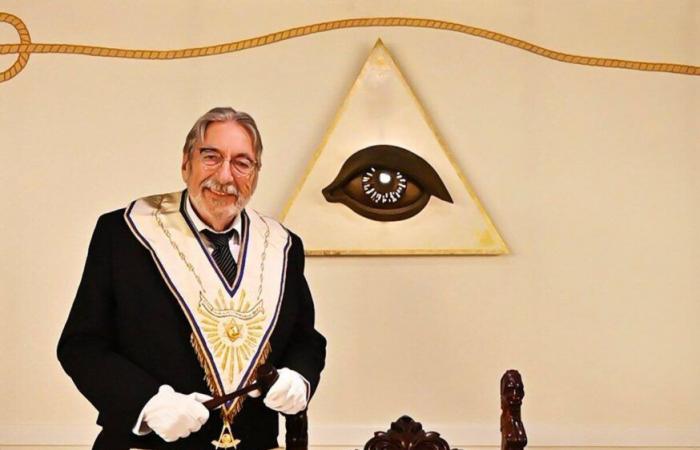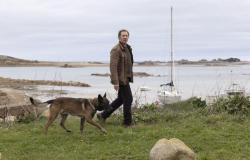
Enthroned in the living room, clearly visible, is a stone hand wielding a compass. Affixed to the base of the sculpture, rests a square. Together, the two tools form the best-known symbol of the Freemasons.
Enough to surprise a guest who does not know the “spiritual life” of the host.
“I don’t hide my affiliation. It’s been almost fifty years since I was initiated and it’s never been a problem to talk about it”says Richard Tobaïlem with a good-natured laugh.
The Initiatory and Traditional Order of Royal Art (OITAR) (1)one of several French Masonic families (read opposite), of which he was twice Grand Master, is organizing a conference on Saturday November 30, in a Nice temple (2).
In the same “spirit of transparency”the retiree lifts the veil on the secrets and fantasies that surround Freemasonry.
Masonic temples are usually closed to the public. Why did you decide to open the doors?
In the Bible [évangile selon Matthieu] it is written: “Knock and it will be opened.” This philosophy also applies to our temples. Any person of good will, who seeks to improve themselves, to improve the world, is welcome. And regardless of the level of diploma, I myself have not studied. Just apply.
However, your meetings are not public, like during a mass or a conference. Only initiates are welcome…
We give ourselves the right to choose those who join us after a series of interviews. This allows us to weed out the simply curious or the extremists.
But by keeping this secret about your activities, about your membership, you arouse curiosity and extremism against you. It’s a bit like a snake biting its own tail…
It's an old dilemma. Revealing ourselves would protect us from all the stories. But we would become a club. You don't join a club to achieve spiritual fulfillment. This quest for truth, this quest for oneself, very intimate, and in this sense very secret, can only be done with people you trust. And as far as I know, you don't share a secret with someone who hasn't demonstrated their sincerity, their value.
Secrecy can also be practical for doing business (3). Don't you swear to support a brother or sister at all costs?
There is a masonry of business cards. It exists. But it's marginal. And it is contrary to the probity that we demand. If a member does any shenanigans, they are removed.
Significant power, particularly on the political level, is still attributed to the Freemasons. What about it?
In France, there is a Freemasonry favoring questions of a societal order and submitting these reflections to the political world. This is the case of the Grand Orient of France, for example, which is the oldest obedience in the country and which has inspired numerous laws. Then, there is a Freemasonry which is not political. Other currents, of which OITAR is a part, focus mainly on the study of symbols and are part of a spiritual approach.
What do you gain from studying symbols?
Freemasonry, which is a school of thought imposing no dogma, provides us with educational tools, such as symbols, to help us know ourselves, correct our faults and understand the world… In society, when we speak about justice, for example, we quickly end up arguing, we don't move forward. But if we question its symbols, we go further. Why does she carry a sword and not a staff? Perhaps because in a sword, the reflection of the bearer is projected. Refers to his humanity, to his responsibility.
Wearing an apron, following a ritual, might this seem anachronistic?
Quite the contrary. The ritual allows us to create a sacred space-time where we escape from everyday problems. Where we can go to meet ourselves. Our modernity, in its materialist and consumerist aspects, pushes towards individualism and leads to existential crises. People need meaning. Of brotherhood. Ideal. And Freemasonry can offer them that.
1- “Royal Art” is an old name for Freemasonry.
2- Information and registration by email: [email protected]
3- In the 2000s, in Nice, the Renard affair, a judge who had mixed genres a little too much on behalf of the National Grand Lodge of France (GNLF), hit the headlines.
OITAR, “the smallest of the great allegiances”
Although it claims the universality of its values, Freemasonry is not a monolithic institution. These selective sociability spaces which claim to be humanist are fragmented between several Masonic associations.
“The Initiatory and Traditional Order of Royal Art is somewhat the smallest of the great obediences of France. And is one of the youngest too, given that it was created in 1974,” summarizes Richard Tobaïlem.
The one who was twice grand master of this federation of lodges, has around 1,500 members spread between France, Overseas, Canada, Portugal and Belgium. In the Alpes-Maritimes, around ten lodges are active.
“As in all our workshops, brothers and sisters work there.“, wishes to emphasize the Freemason, recalling that diversity is not the norm in all obediences.
He adds: “We are part of the so-called liberal branch, where each member is free to believe or not believe in a revealed god.“
He concludes: “Each Masonic family cultivates particularities. But in the end we share the same ideal of a more just and fraternal world.“





